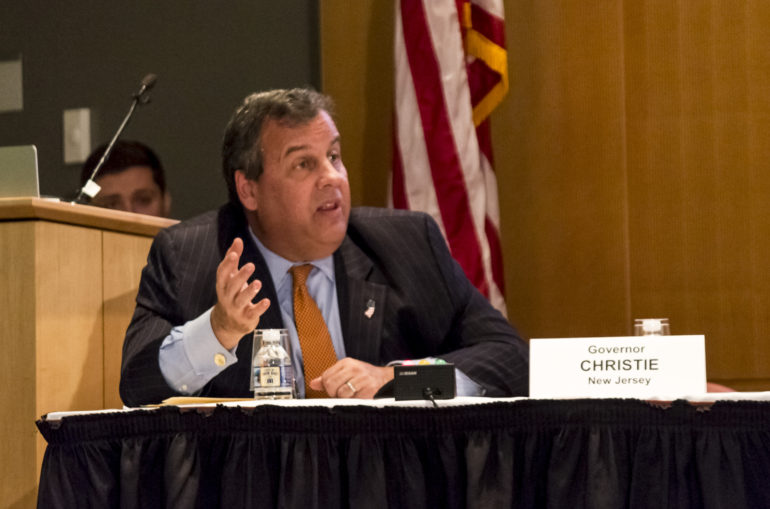BALTIMORE — New Jersey Gov. Chris Christie sent a clear message in his testimony as a witness at a U.S. House Committee on Oversight and Government Reform field hearing Tuesday at The Johns Hopkins Hospital: The opioid fight must be funded.
Christie, chairman of President Donald Trump’s Commission on Combating Drug Addiction and the Opioid Crisis, testified before the committee to discuss his group’s findings, released earlier this month.
The state of Maryland continues to reel from the opioids scourge, with 156 more opioid-related overdose deaths through June of this year than during the same period in 2016, according to state Department of Health and Mental Hygiene data.
Opioid overdose deaths climbed in 16 of Maryland’s 24 jurisdictions over the first half of 2017, compared to the same period in 2016. In Baltimore, the location of Tuesday’s hearing, there were 87 more overdose deaths, an increase of more 30 percent.
Flanked on stage by Rep. Trey Gowdy, R-S.C., the chairman of the House committee, and its ranking member, Rep. Elijah Cummings, D-Md., Christie was asked to break down the more than 50 recommendations from his commission’s final report into three takeaways.
First, Christie said, it’s of paramount importance to address the shipment of powerful synthetic opioids fentanyl and carfentanil.
In Maryland, deaths related to fentanyl, a potent synthetic opioid up to 50 times stronger than heroin, have skyrocketed, health department data show.
Fentanyl-related deaths statewide surged from 469 from January through June in 2016, to 799 deaths over the same time in 2017 — a 70 percent increase.
Furthermore, carfentanil — a fentanyl derivative commonly used to sedate large mammals like elephants — continued its emergence in the second quarter. There have been 46 carfentanil-related deaths statewide over the first two quarters of 2017 compared to none over the same period last year, according to the state health agency.
If the flow of the deadly synthetics into the United States continues unabated, Christie said, the 64,000 drug overdose deaths in America in 2016 will look like “the good ole days.”
He added that “we need to see (the shipment of deadly synthetics) as an attack on our people,” and that in his commission’s report it made clear “that this is a Chinese problem,” as much of the fentanyl — and its potent analogues — come from China.
Christie also called for more enforcement, saying “USPS (United States Postal Service) is delinquent in stopping these drugs” in the mail.
Christie proposed a “real” national conversation about the cost effectiveness of opioid painkillers to take place. This conversation, Christie added, must include the medical community and pharmaceutical companies.
On multiple occasions during his testimony, Christie touted the importance of expediting the process of developing non-opioid, non-addictive painkillers.
In his opening remarks, Gowdy emphasized that pain is real, and that regardless of the addiction crisis, people need ways to manage it.
Christie echoed this notion, “If people have an alternative to opioids, both the physicians that prescribe them and the consumers that take them … it will be a huge help.”
In his third point, Christie said bluntly, “We need to fund better treatment in this country.”
Though he lauded President Trump’s declaration of the opioid crisis as a national public health emergency, he implored that “We need to fund the Public Health Emergency Fund,” which he estimated to have $66,000 in its coffers.
“I don’t think that’s going to do it.”

